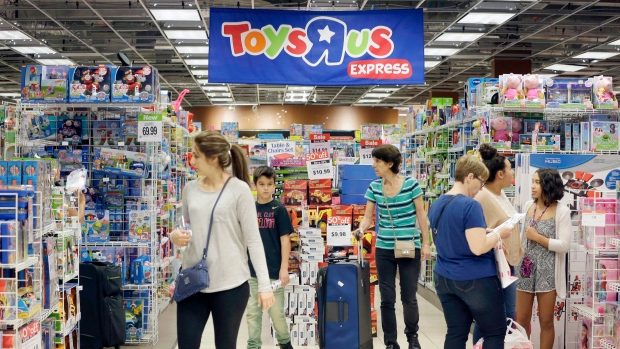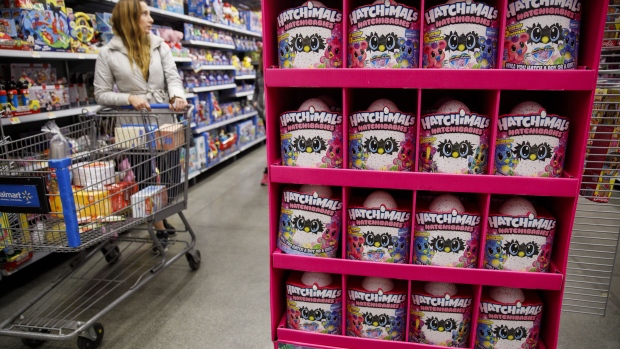Dec 7, 2018
How retailers could fare without a hot holiday toy this year

Tickle Me Elmo. Hatchimals. Cabbage Patch Kids.
These might ring a bell as some of the hot holiday toys in recent memory. But this year – with the toy industry already hurting from the U.S. closure of Toys ‘R’ Us – there doesn’t seem to be a must-have product flying off shelves.
“I would say this season in particular we’re not seeing any one, home-run item where parents and gift-givers would have [their] nose pressed against our windows every day asking if we’ve gotten a shipment,” Melanie Teed-Murch, president of Toys ‘R’ Us Canada, told BNN Bloomberg in a telephone interview.
But Teed-Murch said the retailer isn’t worried about not having a single sought-after toy, adding that it actually boosts business.
“It doesn’t concern me at all,” Teed-Murch said. “As a specialist in the toy category, we’re in this business 365 days a year.”
“So it’s a year when it actually plays to our benefit because we have such a breadth of selection and depth across so many categories. I would say that if I were a retailer that only dabbles in the [toy] category, then I’d be much more concerned than a toy specialist.”

Bruce Winder, co-founder and partner of the Retail Advisors Network, said the lack of a blockbuster toy isn’t unusual, as some holiday seasons simply fail to produce something that really captivates shoppers. But he said it’s still beneficial to have a really hot product on the market during the fourth quarter, when, depending on the retailer, up to 50 per cent of toy sales are made.
“It always helps to have a blockbuster item if nothing else but to draw attention to the category at retail and in the media,” Winder told BNN Bloomberg in an email.
“For mass-merchant retailers like Walmart and Target, toys are a critical traffic-drawing tool to bring customers in their stores to buy toys but also other products.”
Teed-Murch acknowledged the importance of the holiday shopping season to her business, and said the company’s fourth quarter accounts for about 40 per cent of the year’s overall toy sales.
Winder also stressed how “incredibly crucial” the holiday shopping season is for toy retailers.
“If a large majority of your business is toys like Toys ‘R’ Us and Mastermind, it’s all about November and December,” Winder said.
And while many say there’s not a single standout toy for 2018, Toronto-based Spin Master Corp., which supplies toys to retailers, said it expects products with past years’ big names like HatchiBabies and Paw Patrol’s Ultimate Rescue Fire Truck to be popular this season.
L.O.L. Surprise – a line of collectible dolls and accessories – was the top-selling toy in the first half of 2018 globally, according to data from NDP Group, and is expected to continue to be a strong seller for Toys ‘R’ Us Canada, along with other hot products such as Poopsie the Unicorn, and Pikmi Pops.
Winder added companies like Spin Master aren’t dependent on one blockbuster product because of its diversified licenses, similar to Mattel Inc. and Hasbro Inc. He said the real risk for toy companies is the loss of Toys ‘R’ Us in the United States.
“Toys ‘R’ Us is facing a very critical point in their existence as this is the first toy season without the mothership in the U.S., and some Canadian customers may be confused in terms of whether they … are going out of business,” he said.

In its latest earnings call, Spin Master said it was confident the company will manage despite the Toys ‘R’ Us disruption in 2018, and that the company believes the industry will level itself out in 2019. In the third quarter of 2017, Spin Master said it shipped just under $69 million worth of merchandise to Toys ‘R’ Us in the U.S. and $92 million to Toys ‘R’ Us globally – compared to just $13 million in the third quarter this year, all of which was outside the U.S.
Teed-Murch has also noticed the confusion the demise of Toys ‘R’ Us in the U.S. has created north of the border – which led to slowing foot traffic – even after Fairfax Financial Holdings Ltd. bought the Canadian arm of the toy retailer earlier this year.
“I would say it has been a confusing time for Canadian customers, but we are double down and all-in providing that message to them that we are here to play and here to stay,” she said.


